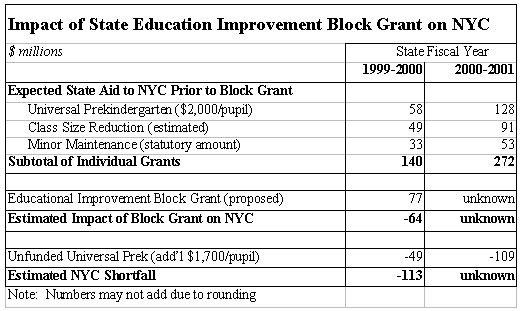
Under a multi-year spending agreement enacted in 1997, the state created grants to make prekindergarten available to all four-year olds, to reduce class sizes to an average of 20 students in kindergarten through grade 3, and to fund minor school building repairs. The Governor's 1999-2000 executive budget proposes the elimination of $225 million in grants statewide for these three programs. In their place, a $200 million Educational Improvement Block Grant is proposed. (The Governor also proposed eliminating a few smaller grants.) The block grant can be used to fund pre-k, class size reduction, and minor maintenance, or any other local educational need.
As shown in the table on page 2, IBO estimates that under the block grant, NYC would receive barely half the $140 million expected under the pre-existing individual grant formulas. The city expected $58 million for universal prekindergarten, $49 million for class size reduction, and $33 million for minor maintenance in individual program grants. Under the Governor's block grant proposal, NYC would receive $77 million (a share corresponding to the city's 38 percent portion of statewide enrollment).
Reduced state aid due to the block grant would exacerbate funding problems for these programs; the level of individual grant funding for universal pre-k and smaller classes was already insufficient to meet state participation targets.
For example, as discussed in IBO's recent report, New York City's Fiscal Outlook (January 1999), the Board of Education already faces a shortfall in universal prekindergarten funding of $49 million in state fiscal year 1999-2000 and $109 million in state fiscal year 2000-2001. The $64 million the city would lose next year as a result of the block grant plus the pre-k shortfall equals a combined gap of $113 million. Prior to the Governor's announcement, BOE had already scaled back plans for class size reduction from full implementation to 75 percent of classes.
The loss of state aid to the city due to the block grant may be greater in subsequent years. Under the current policy of individual grants, the city has been slated to receive major aid increases in state fiscal year 2000-2001 for universal prekindergarten, class size reduction, and minor maintenance programs. With no indication of how large a block grant the city would receive beyond state fiscal year 1999-2000, the full impact of the Governor's proposal in the out-years remains uncertain.
Governor Pataki's latest budget calls for replacing funds for several educational programs with a block grant that could jeopardize New York City's ability to implement the programs.
